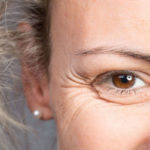Dull Skin
As we enter our 30s, our skin starts to show signs of dullness and develops brown spots due to prolonged exposure to UV rays. Additionally, the process of cell regeneration slows down compared to our youthful years.
It is recommended to exfoliate 1-2 times a week and use brightening agents such as vitamin C and niacinamide to remove dead skin cells, revealing a brighter and smoother complexion. Removing the dry and rough surface layer of the skin also stimulates collagen production.

Prolonged UV exposure can cause skin dullness and the appearance of brown spots.
Loss of Elasticity
The levels of collagen and elastin in our skin naturally decline over time, and the production of these proteins slows down. This can lead to early signs of aging, such as skin sagging and the formation of wrinkles in the forehead, cheeks, and corners of the mouth.
Using a broad-spectrum sunscreen with an SPF of 30 or higher will help promote skin health and enhance the effectiveness of your skincare products.
In addition, incorporating retinol, a derivative of vitamin A, into your daily skincare routine can stimulate collagen production, resulting in firmer and more even-toned skin. Start with a low concentration of retinol and gradually increase as your skin adjusts.
Aging Eye Area
The skin around the eyes is often the first to show signs of aging. This area is characterized by thin, delicate skin with fewer oil-producing glands, making it prone to dehydration and the formation of wrinkles, dark circles, and puffiness.
Eye creams are an effective skincare product to address these concerns. They not only provide moisture but also help reduce puffiness, dark circles, and wrinkles thanks to their high concentration of antioxidants such as vitamins C and E, and ferulic acid.

The thin and delicate skin around the eyes is prone to dehydration and wrinkle formation.
Dry and Sensitive Skin
In your 30s, it’s important to adopt a gentle skincare routine. Keep in mind that your sebaceous glands become less active, making your skin more prone to dehydration. This can disrupt the natural moisture balance, resulting in a rough and dull complexion.
Opt for moisturizing products with quick absorption, such as gel-based creams and milk moisturizers. Enhance their hydrating effects with ingredients like hyaluronic acid and glycerin. Steer clear of products containing alcohol and soap, which can be drying.
In addition to external factors, changing hormones can also make your skin more sensitive and reactive. This can affect your skin’s natural moisture levels and its ability to recover. Choose products rich in moisture and containing restorative ingredients such as ceramides, glycerin, niacinamide, and hyaluronic acid to maintain a youthful, dewy complexion.



































